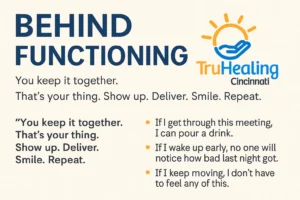You keep it together.
That’s your thing. Show up. Deliver. Smile. Repeat.
Your house is clean, your inbox is managed, and your calendar has zero blank spots. On paper, you’re crushing it. You’re the kind of person people trust with big projects, hard conversations, last-minute emergencies.
But what they don’t see is the negotiation behind the scenes:
“If I get through this meeting, I can pour a drink.”
“If I wake up early, no one will notice how bad last night got.”
“If I keep moving, I don’t have to feel any of this.”
This is the reality for many high-functioning adults living with hidden addiction. And for a long time, there’s nowhere to put that truth—because who believes the person who looks fine is falling apart?
At TruHealing Cincinnati, we saw the gap—and we designed an IOP (intensive outpatient program) specifically for people like you. People who haven’t hit rock bottom—but are exhausted from toeing the edge of it every day.
You’re Not “Too Functional” for Treatment
If you’ve ever thought:
- “But I haven’t lost anything—do I even qualify for help?”
- “I’m not out of control, I’m just… managing badly.”
- “What if treatment makes me lose everything I’ve built?”
You’re not alone. These are real fears. And they’re exactly what keep high-functioning people stuck longer than they need to be.
High-functioning addiction wears a tailored suit. It sends emails on time. It shows up to meetings. It holds conversations with a smile. But behind that mask, it’s quietly bleeding energy, clarity, and connection.
And just because you haven’t crashed doesn’t mean you’re not stuck.
What We Saw Missing in Traditional IOP Models
Most IOPs are built for visible crisis—DUIs, overdoses, job loss, relationships in shambles. And while that level of care saves lives, it can alienate people who don’t fit that picture.
We started asking:
- What about the people who still show up—but feel dead inside?
- What about the ones whose drinking or using is invisible to everyone but them?
- What if looking fine is actually the biggest barrier to getting better?
At TruHealing Cincinnati, our IOP was built to answer those questions—and break the binary of “addict or not.” We know the truth is messier. And we meet you there.
How IOP Works When You’re High-Functioning (But Hollowed Out)
Our IOP isn’t about removing you from your life. It’s about helping you return to it—honestly.
Here’s what that looks like:
- Flexible scheduling for people with careers, kids, and commitments
- Evening and daytime groups so you don’t have to choose between your job and your recovery
- Clinicians who understand high-performance burnout and the emotional labor of maintaining appearances
- Curriculum that addresses perfectionism, control, and fear of exposure
- Group peers who get it—you won’t be the only one in the room still wearing business clothes
And if you’re not based directly in Cincinnati, know this: our programs are accessible to those seeking IOP in nearby regions like Lexington or Lawrenceburg, Kentucky.

What You Might Be Telling Yourself (And Why It’s Not True)
Lie: “If I admit I have a problem, I’ll lose everything.”
Truth: Most of our clients protect their relationships, health, and careers by getting support before they collapse.
Lie: “I don’t need IOP—I’m still functioning.”
Truth: “Functioning” is not the same as thriving. And continuing to “hold it together” while privately unraveling isn’t strength—it’s survival mode.
Lie: “I’ll be the odd one out.”
Truth: Our IOP groups are filled with professionals, parents, leaders, and overachievers who once thought the same thing.
There’s no prize for waiting until it’s unbearable. And you don’t have to be a shell of yourself before you’re allowed to want something better.
What Changes When You Finally Say It Out Loud
Here’s what our clients tell us, again and again:
- “I didn’t know how heavy the mask was until I took it off.”
- “This was the first space where I didn’t feel ashamed for being ‘almost okay.’”
- “I used to think IOP was for people with bigger problems. Now I think it’s the smartest thing I’ve ever done.”
It’s not magic. It’s realignment.
Instead of organizing your life around keeping up appearances, IOP helps you build a life that doesn’t require hiding.
That’s what honesty offers—not destruction, but freedom.
Why Now Is the Smart Time to Reach Out
Waiting won’t make this go away. It only sharpens the split between how you look and how you feel.
Here’s what’s quietly at stake if you delay:
- Your physical and mental health
- Your ability to actually enjoy the life you built
- Your relationships (even the ones that seem okay)
- Your sense of identity
- Your emotional bandwidth
- Your ability to ask for help without collapsing first
IOP is not the end of your success story. It’s the part where you stop suffering silently and start getting honest—with others, and with yourself.
FAQs: What High-Functioning Adults Want to Know About IOP
Do I have to stop working to enter IOP?
No. Our program is specifically designed for people who need to stay employed while getting treatment. We offer daytime and evening options.
Will I be in groups with people who aren’t like me?
You’ll be surprised how many “functional” people end up in the same room. Our groups often include parents, professionals, and people who’ve never been to treatment before.
What if I don’t call it addiction?
You don’t need to label yourself to get support. If you’re using something to cope—and it’s starting to cost you—it’s enough to start a conversation.
Is IOP private and confidential?
Yes. We protect your privacy with the same seriousness you’d expect from any healthcare provider. No one outside the program needs to know unless you choose to share.
I’ve done therapy before. How is IOP different?
IOP offers a deeper level of accountability, structure, and community. It’s more intensive than weekly therapy, with focused support multiple times per week.
It’s Not Too Early. And You’re Not Too “Put Together” to Get Help.
We built this IOP for you.
For the one who doesn’t miss work, but hasn’t felt joy in months.
For the one who hides bottles behind books, and shame behind sarcasm.
For the one who’s tired of carrying it all without letting anyone see what it’s doing to them.
You don’t have to fall apart to start over.
You just have to stop lying to yourself about what “fine” really means.
Ready to talk to someone who sees past the mask?
Call (888) 643-9118 or visit to learn more about our Intensive Outpatient Program services in Cincinnati, Ohio.


